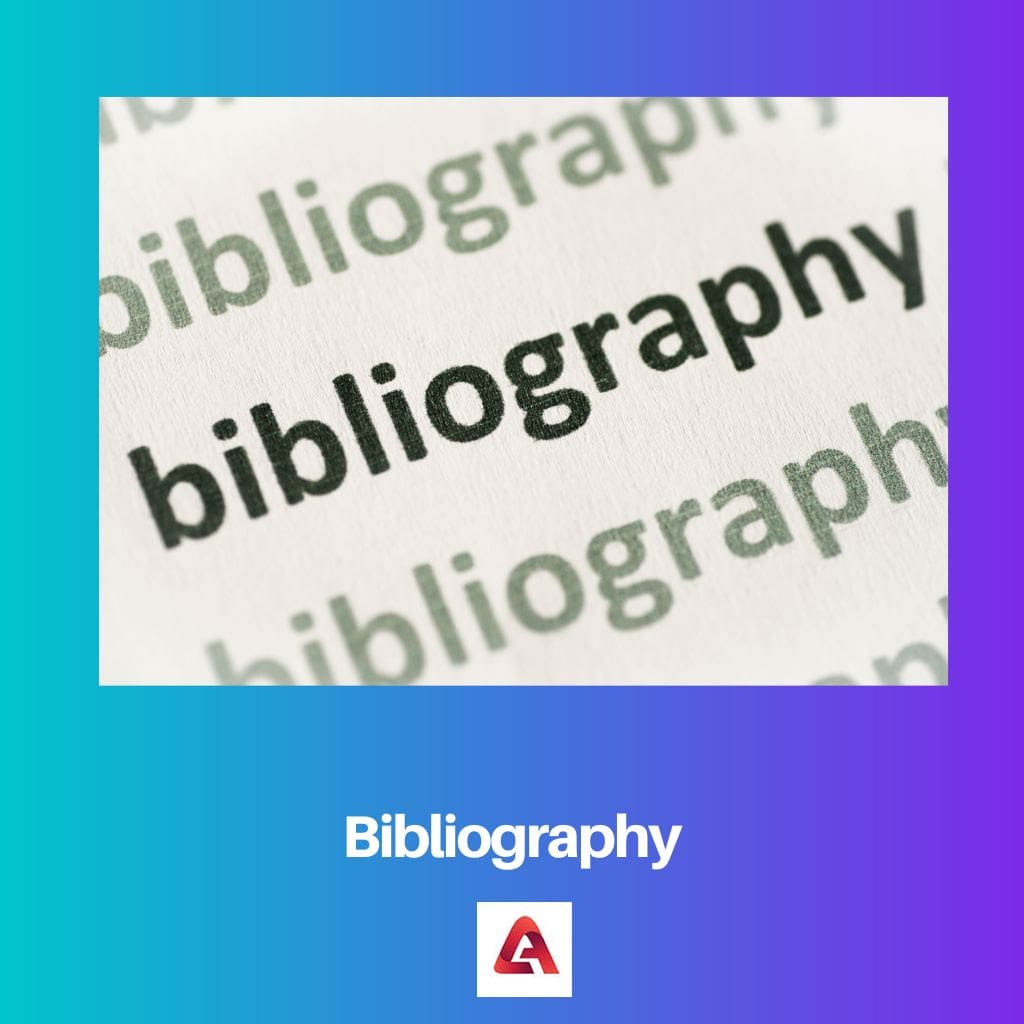Derived from the Greek word ‘biblion,’ meaning ‘book,’ and ‘graphia,’ referring to ‘writing,’ the word bibliography is an amalgamation of the two. It is, as such, used in a slightly different context today. Originally, a bibliography implied a field of academia that studied the book as an object or a symbol and an integral part of cultural phenomena. It was concerned with the understanding of books through listing by chronology and devising new ways to describe them.
In the field of academia itself, the word bibliography has another related but vastly different meaning. You may find this at the end of any scholarly work, under the title ‘References,’ ‘Works Cited,’ or simply ‘Bibliography.’ It is a comprehensive list detailing all the books, articles, papers, and journals the author has referred to or used to compose the scholarly work.
Key Takeaways
- A bibliography lists sources for researching a particular topic or writing a book.
- A bibliography includes the author’s name, the working title, the publication date, and other relevant information.
- A bibliography is important for crediting the authors of the sources used and allowing readers to locate the sources themselves.

What does a bibliography consist of?
Three broad ways to qualify bibliographies are attached at the end of any work.
1. Enumerative Bibliography – The most common type of bibliography is one in which all the work sources are listed one after another, sorted according to categories of publication or alphabetical order. This contains extensive publication dates, the publisher’s name, and other technical details.
2. Descriptive Bibliography – This contains a detailed description of the physical aspects of the book or works in question, such as details regarding the paper quality, illustrations within the book, the cover art, and binding, among others.
3. Analytical Bibliography – This belongs more to the academic field of bibliography studies in which a book is analyzed by considering the physical traits of the object and the tradition of social and historical practices it is a product of.
Other examples
In modern times this term has lent itself to the creation of a host of other terms which are similar in meaning but used in fields other than written scholarly works. For instance, the term discography has been coined to refer to a particular artist’s recorded music list. Filmography and webography are other words that imply the same in other contexts.
Advantages of a Bibliography
- It can be viewed as an essential component of any academic work that ensures transparency and better communication of intentions.
- It helps build a coherent and holistic understanding of any work and the material on which the scholarly work is built.
- It helps to create a taxonomy in any field, as the bibliography clearly shows how critical thought has progressed.
Disadvantages of Bibliography
- It has also been viewed as disrupting the flow of thought in an academic work, where each citation has little or no link with the other and may break the continuity of the finished work.
- Due to such fragmentation, it can draw excessive interest from the reader to unimportant areas while leaving large sections unreferenced.
- https://www.journals.uchicago.edu/doi/abs/10.1086/617874?journalCode=lq
- https://www.jstor.org/stable/40372176?seq=7#metadata_info_tab_contents
Last Updated : 11 June, 2023


Emma Smith holds an MA degree in English from Irvine Valley College. She has been a Journalist since 2002, writing articles on the English language, Sports, and Law. Read more about me on her bio page.

I found this article to be quite ironic considering the disadvantages noted. While it can be true, there are ways to mitigate such issues.
You’re absolutely right. It’s ironic in that sense, yet it has many advantages.
Absolutely, and a thorough bibliography is indeed essential.
This article is very informative about the different types of bibliographies. The reference list is also quite complete.
Yes, I appreciate the comprehensive explanation given here.
Absolutely, this post provided great insights into the topic.
I find this article to be quite comical in its approach to the advantages and disadvantages of bibliographies, but in a good way.
I see what you mean – it’s a unique take on the matter.
Absolutely, its approach is somewhat refreshing.
A clear and concise explanation of the topic at hand. Nicely done.
The references provided are top-notch, adding significant value to the content. Great work!
Indeed, the references really bolster the information presented in the article.
The details provided about the different types of bibliographies are quite illuminating. It’s a great read.
Absolutely, very informative.
Indeed, it’s a valuable resource for those seeking clarity on the subject.
The advantages of bibliographies mentioned in the article are outstanding! It indeed does help in creating a taxonomy in any field.
I completely agree with you!
I disagree with the idea that bibliographies can be disruptive to an academic work. This may be true if it is not well structured, but a properly done bibliography tends to complete the text.
Yes, it all comes down to how it is executed. A well-done bibliography is more beneficial than disruptive.
A well-composed bibliography is of utmost importance in any scholarly work.
I couldn’t agree more.
I believe a bibliography is a very important resource, it helps a lot in the process of writing an academic text and also in understanding the field that surrounds the research. It is very good that this article mentions its benefits.
Absolutely, I agree with you on that. It is good to understand its advantages.
Yes, it is a useful tool that contributes to the academic integrity of any work.